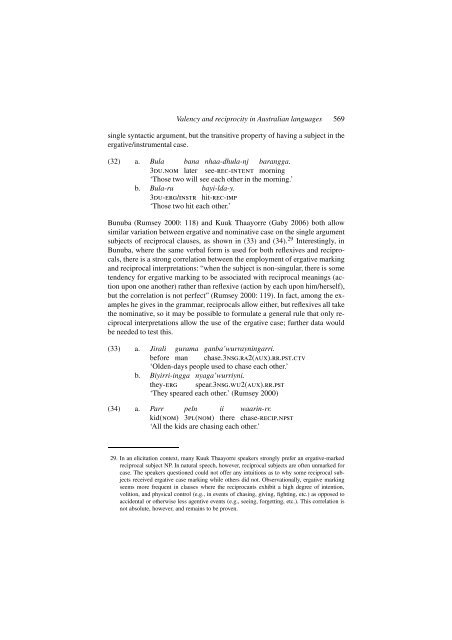Valency mismatches and the coding of reciprocity in ... - Linguistics
Valency mismatches and the coding of reciprocity in ... - Linguistics
Valency mismatches and the coding of reciprocity in ... - Linguistics
You also want an ePaper? Increase the reach of your titles
YUMPU automatically turns print PDFs into web optimized ePapers that Google loves.
<strong>Valency</strong> <strong>and</strong> <strong>reciprocity</strong> <strong>in</strong> Australian languages 569<br />
s<strong>in</strong>gle syntactic argument, but <strong>the</strong> transitive property <strong>of</strong> hav<strong>in</strong>g a subject <strong>in</strong> <strong>the</strong><br />
ergative/<strong>in</strong>strumental case.<br />
(32) a. Bula bana nhaa-dhula-nj barangga.<br />
3du.nom later see-rec-<strong>in</strong>tent morn<strong>in</strong>g<br />
‘Those two will see each o<strong>the</strong>r <strong>in</strong> <strong>the</strong> morn<strong>in</strong>g.’<br />
b. Bula-ru bayi-lda-y.<br />
3du-erg/<strong>in</strong>str hit-rec-imp<br />
‘Those two hit each o<strong>the</strong>r.’<br />
Bunuba (Rumsey 2000: 118) <strong>and</strong> Kuuk Thaayorre (Gaby 2006) both allow<br />
similar variation between ergative <strong>and</strong> nom<strong>in</strong>ative case on <strong>the</strong> s<strong>in</strong>gle argument<br />
subjects <strong>of</strong> reciprocal clauses, as shown <strong>in</strong> (33) <strong>and</strong> (34). 29 Interest<strong>in</strong>gly, <strong>in</strong><br />
Bunuba, where <strong>the</strong> same verbal form is used for both reflexives <strong>and</strong> reciprocals,<br />
<strong>the</strong>re is a strong correlation between <strong>the</strong> employment <strong>of</strong> ergative mark<strong>in</strong>g<br />
<strong>and</strong> reciprocal <strong>in</strong>terpretations: “when <strong>the</strong> subject is non-s<strong>in</strong>gular, <strong>the</strong>re is some<br />
tendency for ergative mark<strong>in</strong>g to be associated with reciprocal mean<strong>in</strong>gs (action<br />
upon one ano<strong>the</strong>r) ra<strong>the</strong>r than reflexive (action by each upon him/herself),<br />
but <strong>the</strong> correlation is not perfect” (Rumsey 2000: 119). In fact, among <strong>the</strong> examples<br />
he gives <strong>in</strong> <strong>the</strong> grammar, reciprocals allow ei<strong>the</strong>r, but reflexives all take<br />
<strong>the</strong> nom<strong>in</strong>ative, so it may be possible to formulate a general rule that only reciprocal<br />
<strong>in</strong>terpretations allow <strong>the</strong> use <strong>of</strong> <strong>the</strong> ergative case; fur<strong>the</strong>r data would<br />
be needed to test this.<br />
(33) a. Jirali gurama ganba’wurrayn<strong>in</strong>garri.<br />
before man chase.3nsg.ra2(aux).rr.pst.ctv<br />
‘Olden-days people used to chase each o<strong>the</strong>r.’<br />
b. Biyirri-<strong>in</strong>gga nyaga’wurriyni.<br />
<strong>the</strong>y-erg spear.3nsg.wu2(aux).rr.pst<br />
‘They speared each o<strong>the</strong>r.’ (Rumsey 2000)<br />
(34) a. Parr peln ii waar<strong>in</strong>-rr.<br />
kid(nom) 3pl(nom) <strong>the</strong>re chase-recip.npst<br />
‘All <strong>the</strong> kids are chas<strong>in</strong>g each o<strong>the</strong>r.’<br />
29. In an elicitation context, many Kuuk Thaayorre speakers strongly prefer an ergative-marked<br />
reciprocal subject NP. In natural speech, however, reciprocal subjects are <strong>of</strong>ten unmarked for<br />
case. The speakers questioned could not <strong>of</strong>fer any <strong>in</strong>tuitions as to why some reciprocal subjects<br />
received ergative case mark<strong>in</strong>g while o<strong>the</strong>rs did not. Observationally, ergative mark<strong>in</strong>g<br />
seems more frequent <strong>in</strong> clauses where <strong>the</strong> reciprocants exhibit a high degree <strong>of</strong> <strong>in</strong>tention,<br />
volition, <strong>and</strong> physical control (e.g., <strong>in</strong> events <strong>of</strong> chas<strong>in</strong>g, giv<strong>in</strong>g, fight<strong>in</strong>g, etc.) as opposed to<br />
accidental or o<strong>the</strong>rwise less agentive events (e.g., see<strong>in</strong>g, forgett<strong>in</strong>g, etc.). This correlation is<br />
not absolute, however, <strong>and</strong> rema<strong>in</strong>s to be proven.

















